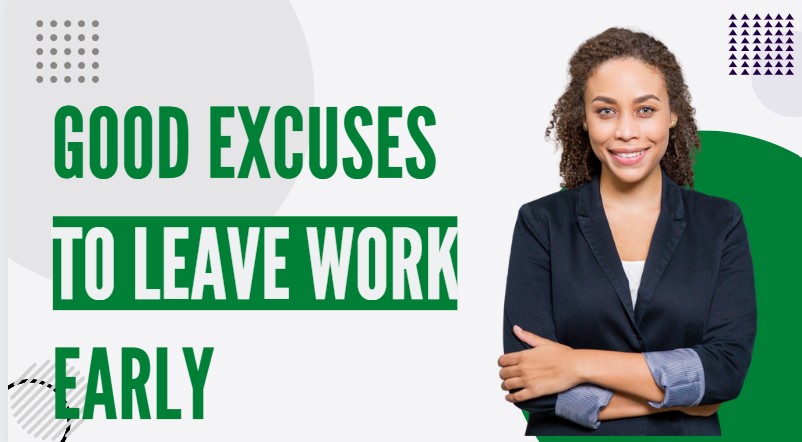Good Excuses to Leave Work Early
Being present at your job at all times is vital for productivity. You’re a valuable asset to your organization. However, sometimes you will require a sick day, a day off, or even just a single afternoon off. There are a lot of reasons for this. It can be due to undertaking your home improvement task, or you may need time to plan for a momentous occasion.
According to experts, “your explanation shouldn’t always include private info. For instance, you don’t have to give details a severe medical issue you have.”
Before trying to make your request, ensure your company’s culture into account. Other factors to consider are workplace rules and your lifestyle and background. If you’re a good worker, your employer will certainly fulfill your request without fuss.
Are you guilty of poor habits like abandoning work on a daily basis? Do you often arrive late? Your boss will disagree unless you have an urgent reason for quitting early.

Read: Why is Khaite so expensive? (6 Reasons to own a piece of Khaite + All About Khaite)
Here are some acceptable excuses to leave work early and how to make requests:
Good Reasons for Leaving Work Early
While there are all good—and bad—excuses to exit work early, remember that your boss’s reply will depend largely on your status as an employee rather than on the reason you give.
No matter how good your reasons are, the more times you try to leave early, the harder it’s going to be to do so without facing criticism. In the end, you have to be honest about the reason(s) for leaving your workplace early exit.
In spite of this, it depends on your company’s ethos; as long as you are in excellent standing and your boss is a sensible, compassionate person, he or she might understand the issue and grant a request to leave early once in a while.
Here are a few widely accepted reasons for leaving work early:
Religious commitments or community-related projects, like volunteer work at an occasion offered by a local agency (particularly if your organization encourages civic engagement).
Business networking events, such as participating in trade shows or conferences or taking part in a chamber of business events.
Engagements relating to clients, like engaging on a trip with a prominent client or flying to a client project that would take place early the following day.
Career development activities, such as enrolling in a course that your boss has recommended you to participate in, attending a seminar, arriving early for a course, or working on a group task.
Productivity-related requests, such as taking your tasks to a nearby cafeteria or reading room to concentrate or taking leave (once work is finished) after deciding to stay in the workplace very late the evening before.
Employment-related activities, such as an interview session, if you have been told that your current employer will be sacking you soon.
Family responsibilities, such as serious medical conditions, mishaps or death, or if you want to pick up your kid if the school closes early or if your kid is unwell.
Illness, for instance, or an ailment such as stomach pains, severe headache, allergies, or a dental emergency such as a tooth extraction or a gum disease.
Bad Reasons for Leaving Work Early
Yet again, how your manager feels about you as an employee will greatly influence whether or not they agree to your request to leave early. For instance, are you known around as a hard-working person? If the response is basically “yes,” therefore the best reason to provide is an honest one.
Having said that, there are definitely some poor reasons. They include:
Boredom or lack of work to do. If you request to work more hours once you’re caught up, you’ll earn some extra points. If you request to work more hours once you’re caught up, you’ll earn some extra points.
Feeling drunk. It’s one thing to leave early because you’re ill, but don’t count on getting much compassion for a problem you caused yourself.
Going to spend time with friends. Even if your closest friend is visiting, if you want to leave early for optional recreation activities, in most businesses, you would be required to take a formal personal day for this.
Heading to an interview for a new job (unless you’ve recently been fired).
Getting disappointing news at work. For instance, if you’re displeased with the letter about next year’s dwindling pay rise, if you got a less-than-stellar performance evaluation, or if your boss just critiqued your project, be a team player and endure the remainder of the day, no regardless of how disappointed you might be.
Exhaustion or stress out. Don’t give the impression that you can’t manage stress. If you discover that you can’t concentrate at your desk, ask if you may move your work to a nearby cafeteria or want to have a meeting room all to yourself for an hour.
If you discover that you can’t concentrate at your desk, ask if you may move your work to a nearby cafeteria or want to have a meeting room all to yourself for an hour.
Attending a leisure event. Whether you are attending a golf tournament after work or you scheduled a yoga class—unless it is a company-sponsored activity, oftentimes, it unacceptable to leave early from work for these reasons.
Seemingly trivial issues, including a quarrel with a neighbor or a relationship breakdown with the girlfriend you’ve been dating for only six days.
Non-urgent tasks that can be completed after hours, such as a salon visit, an oil change, shopping for food, or hurrying to the bank, can be completed online or on the weekend instead.
Factors That Can Improve or Reduce Your Chances of Leaving Early
Generally, it isn’t a big deal if you leave work early every once in a while. However, certain factors can make it simpler—or more difficult—to secure your boss’s approval. You’re pretty fortunate if you work for a manager that’s responsive and empathetic. If not, it’s possible that you’ll be required to get past company policy and official clearance to request time off.
Company’s culture.
A primary consideration is company culture. Some employers require that employees arrive early and remain at work till late hours to demonstrate their commitment, whereas others encourage staff to look after their health and keep a positive work-life balance.
It’s possible that you could get a half day off work if your company allows it. If you’re unsure of the amount of time off, you’re entitled to for a partial day off, consult your boss, human resources desk, or policy manual.
Your relationship with your boss.
If you and your boss are friendly, you may have an easier time convincing them to let you clock out early. Part of this is in your hands—for instance, you may build trust by being trustworthy and reliable, but some of it is just a matter of luck. If you and your boss have communication problems or other relationship difficulties, it will clearly be more difficult to persuade them.
Your employment history.
Employees who routinely arrive late, leave work early, or abandon work without a valid excuse may find it difficult to have their requests approved.
Employees who are seen as committed by their managers and coworkers are more likely to receive favorable treatment at work and, in some situations, special perks.
FAQ
What are the best reasons to leave work early?
- Personal illness or accident.
- Doctor’s appointment
- family crisis
- emergency at home.
What is a good last-minute excuse?
Sensible excuses to leave the office early at short notice include child-related services, personal care, last-minute family emergence, family problem, home break-in, parcel delivery, power issue, stomach ache, chest pains, abdomen issues, period pain, constipation, infectious sickness, oncoming cold etc.
